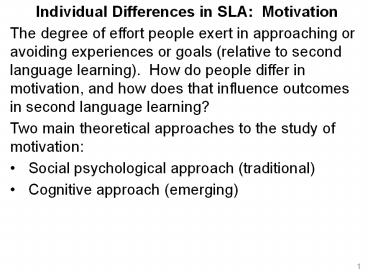Individual%20Differences%20in%20SLA:%20Motivation - PowerPoint PPT Presentation
Title:
Individual%20Differences%20in%20SLA:%20Motivation
Description:
Individual Differences in SLA: Motivation The degree of effort people exert in approaching or avoiding experiences or goals (relative to second language learning). – PowerPoint PPT presentation
Number of Views:226
Avg rating:3.0/5.0
Title: Individual%20Differences%20in%20SLA:%20Motivation
1
- Individual Differences in SLA Motivation
- The degree of effort people exert in approaching
or avoiding experiences or goals (relative to
second language learning). How do people differ
in motivation, and how does that influence
outcomes in second language learning? - Two main theoretical approaches to the study of
motivation - Social psychological approach (traditional)
- Cognitive approach (emerging)
1
2
- Motivation Social psychological approach
- Integrative Motivation
- Motivation in SLA driven by a sincere and
personal interest in the people and culture
represented by the other language group --
Gardner, R. C., MacIntyre, P. D. (1991). An
Instrumental Motivation in Language Study Who
Says It Isnt Effective? Studies in Second
Language Acquisition, 13, 57-72, p. 58. - Instrumental Motivation
- Motivation in SLA driven by the practical value
and advantages of learning a new language
(Gardner and MacIntyre, 1991, p. 58).
2
3
- Motivation Social psychological approach
- The godfather of the social psychological
approach in studies of motivation in SLA Robert
C. Gardner. 100s of studies with numerous
collaborators, going back to the 1950s. - For a review of 75 such studies, see Masgoret,
A., Gardner, R. (2003). Attitudes, Motivation,
and Second Language a Learning A Meta-Analysis
of Studies Conducted by Gardner and Associates.
Language Learning, 53, 123163.
3
4
- Motivation Social psychological approach
- Most studies of motivation from the social
psychological approach use standard methodology
for studies in affective domain self-report
data from questionnaire correlated with
performance data from language test. - Gardner and MacIntyre (1991) used the Attitude /
Motivation Test Battery with vocabulary test data
to achieve results we might expect re
integrative and instrumental motivation.
4
5
- Motivation Social psychological approach
- Integrative
5
6
- Motivation Social psychological approach
- Instrumental
6
7
- Motivation Social psychological approach
- Over the years, Gardners many empirical studies
have informed the development of his
socio-educational model of second language
acquisition. - The model emphasizes that there are two primary
individual difference variables involved in
language learning, viz., ability intelligence
and aptitude and motivation -- Gardner, R.C.
(2006). The socio-educational model of Second
Language Acquisition A research paradigm.
EUROSLA Yearbook, 6, 237260, p. 241.
7
8
- Motivation Social psychological approach
- We can see this emphasis of ability and
motivation in the process graphic of the model
8
9
- Motivation Social psychological approach
- It is proposed that other things being equal,
the student with higher levels of ability (both
intelligence and language aptitude) will tend to
be more successful at learning the language than
students less endowed. Similarly, other things
being equal, students with higher levels of
motivation will do better than students with
lower levels (p. 241).
9
10
- Motivation Social psychological approach
- A main feature of the socio-educational model is
motivation (p. 242).
10
11
- Motivation Social psychological approach
- More specifically, Gardner focuses on the link
between three of constructs motivation,
attitudes toward the learning situation, and
integrativeness (i.e., an openness to the target
language group (p. 237).
11
12
- Motivation Social psychological approach
- The unidirectional arrows indicate that levels
of motivation are influenced and maintained by
Attitudes toward the Learning Situation and
Integrativeness. The dotted line indicates that
In some situations Instrumentality could also
support motivation (p. 245).
12
13
- Motivation Cognitive approach
- Intrinsic Motivation
- Learners demonstrate an intrinsic orientation if
their rationale for engaging in a task is
challenge, curiosity, learning or mastery -- Li,
D. (2006). Motivation in Second Language
Acquisition in Chinese Research Students in the
UK. Evaluation and Research in Education, 19,
3858, p. 40. - Extrinsic Motivation
- If learners reasons for engaging in a task are
to obtain rewards, grades or approval from
others, they are considered to be extrinsically
oriented (Li, 2006, p. 40).
13
14
- Motivation Cognitive approach
- Li (2006) conducted a qualitative study of
Chinese research students in the UK. Data were
collected in semi-structured interviews with
open-ended questions the respondents were
prompted to reflect on their own learning
experiences. - Data suggest that respondents mainly adopted
extrinsic orientations. They believed that
learning English would facilitate their current
research and improve their career prospects (p.
45).
14
15
- Motivation Cognitive approach
- For an excellent review of the cognitive approach
in motivation studies, relative to the social
psychological approach, see Dörnyei, Zoltán.
(2003). Attitudes, Orientations, and Motivations
in Language Learning Advances in Theory,
Research, and Applications. Language Learning, 53
(Supplement 1), 332.
15
16
- Motivation Wright McGrory
- One study of motivation in language learning that
draws on both these approaches (i.e., social
psychological and cognitive) is Motivation and
the Adult Irish Language Learner.
16































